Click on the images below to view the reports on these sessions from this year’s virtual Rural Scottish Parliament.
vRSP21 Session Report – Good Food
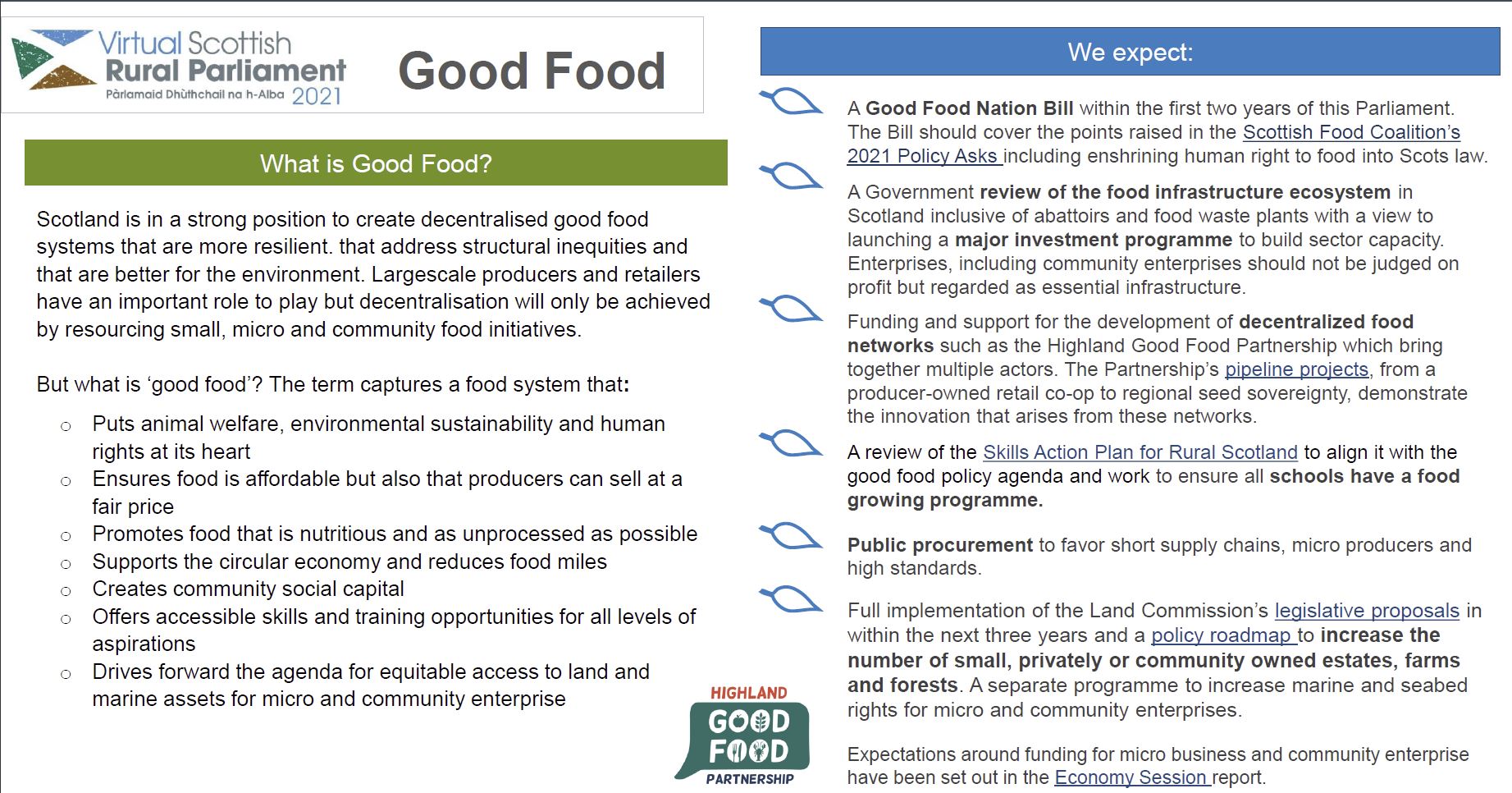
vRSP21 Session Report – Rural and Island Social Care
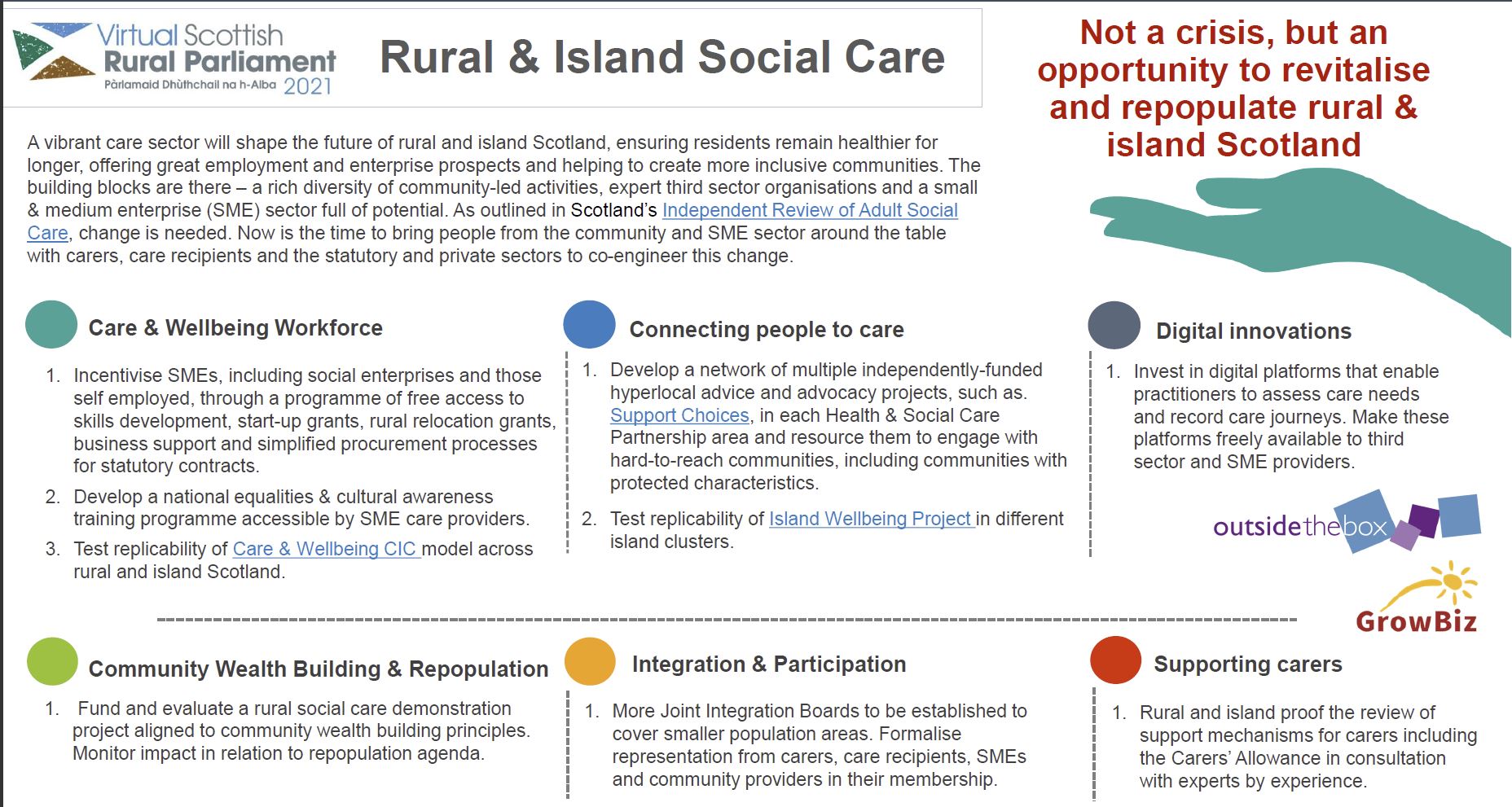
vRSP21 Session Report – Mental Wellbeing
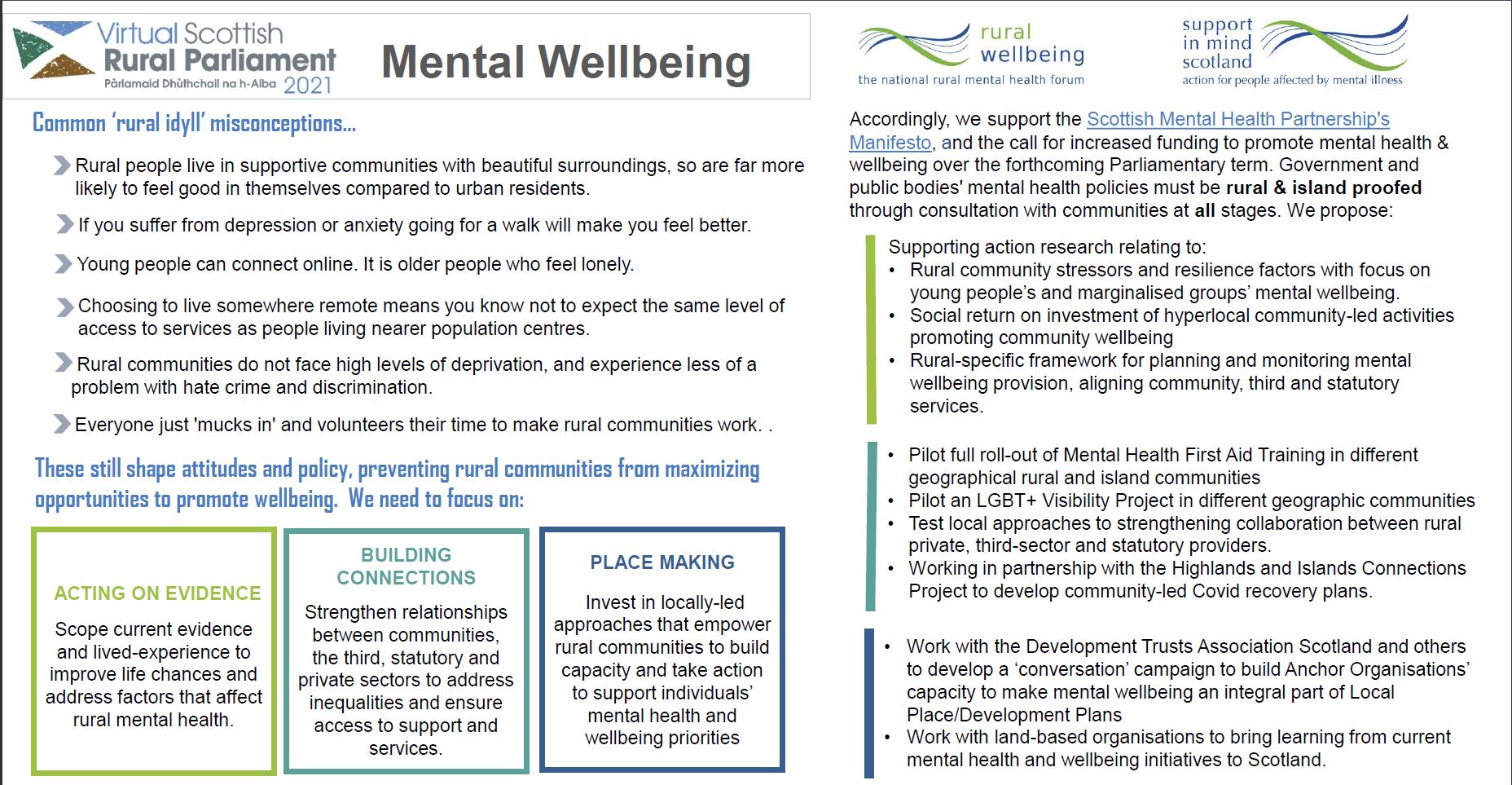
Click on the images below to view the reports on these sessions from this year’s virtual Rural Scottish Parliament.
vRSP21 Session Report – Good Food

vRSP21 Session Report – Rural and Island Social Care

vRSP21 Session Report – Mental Wellbeing

The virtual Scottish Rural Parliament, held earlier this year, has published its session reports which will share over the coming weeks.
Whilst a dedicated Housing Session was not held at the 2021vSRP as the curators – Rural Housing Scotland – had recently delivered their Rural Housing Summit in February 2021 and published a comprehensive manifesto, the sessions on Transport and 20 Minute Neighbourhoods are an important follow-on from our Island Voices recording on Housing and emphasise the interconnectedness of these issues.
Click on the images below to view the session reports in more detail.

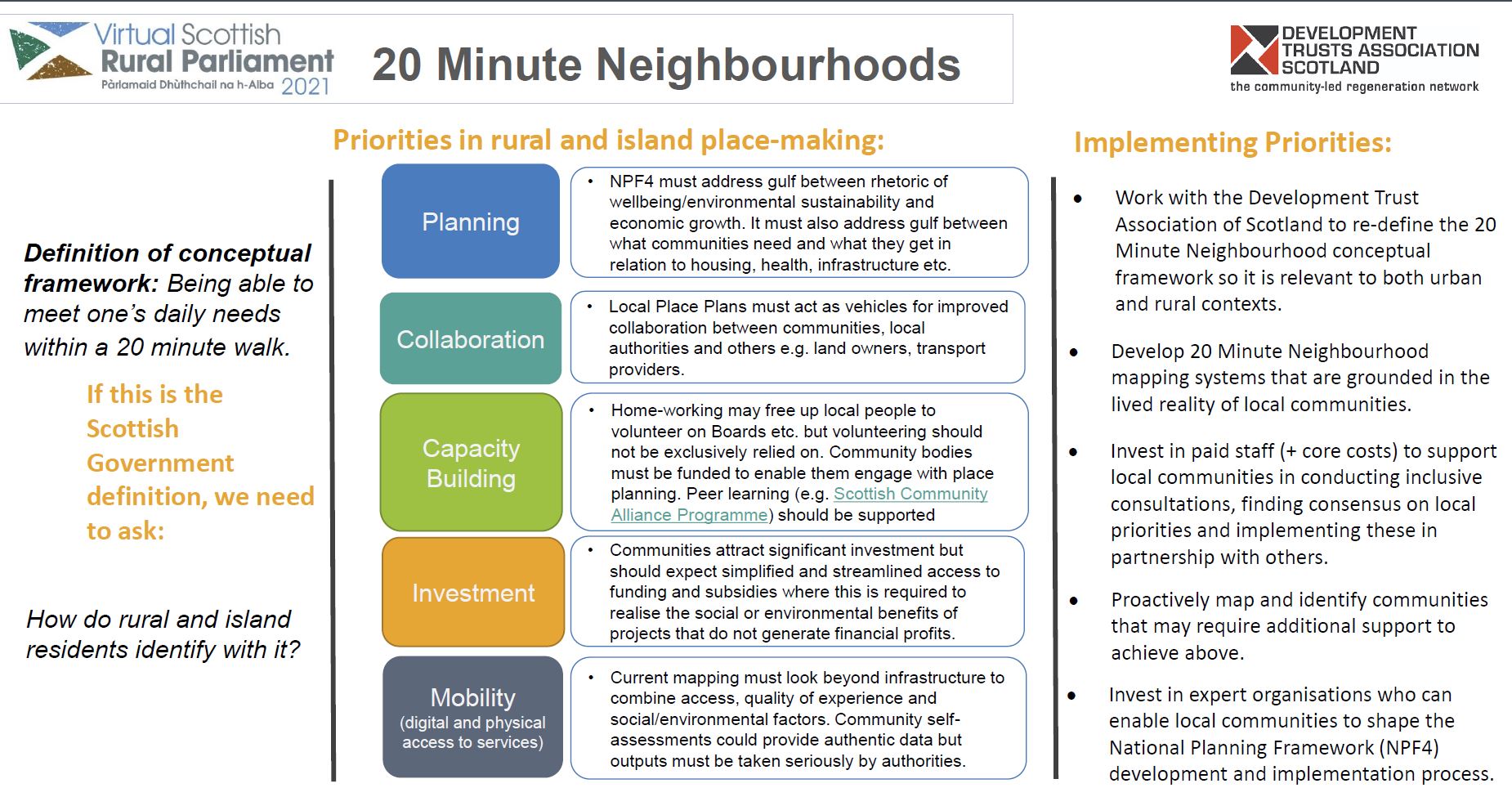
We are excited to announce the launch of Uist Beò, a new digital platform celebrating the unique culture and the thriving life of our islands, from Berneray to Eriskay!
Uist Beò was created to connect Uist residents of all ages and to shine a light on the individuals, businesses and organisations that come together to make our islands the distinct and dynamic places they are to live, work and visit.
Every one of our 5000 residents has a unique story to tell of their island life, whether that is one that continues generations of island living, a move to Uist from elsewhere or the call of home after time spent away. Check out our website to see the first eight of what will become a wide-ranging catalogue of written and photographic tales of vibrant Uibhist life, of what it means to live and work in Uist.
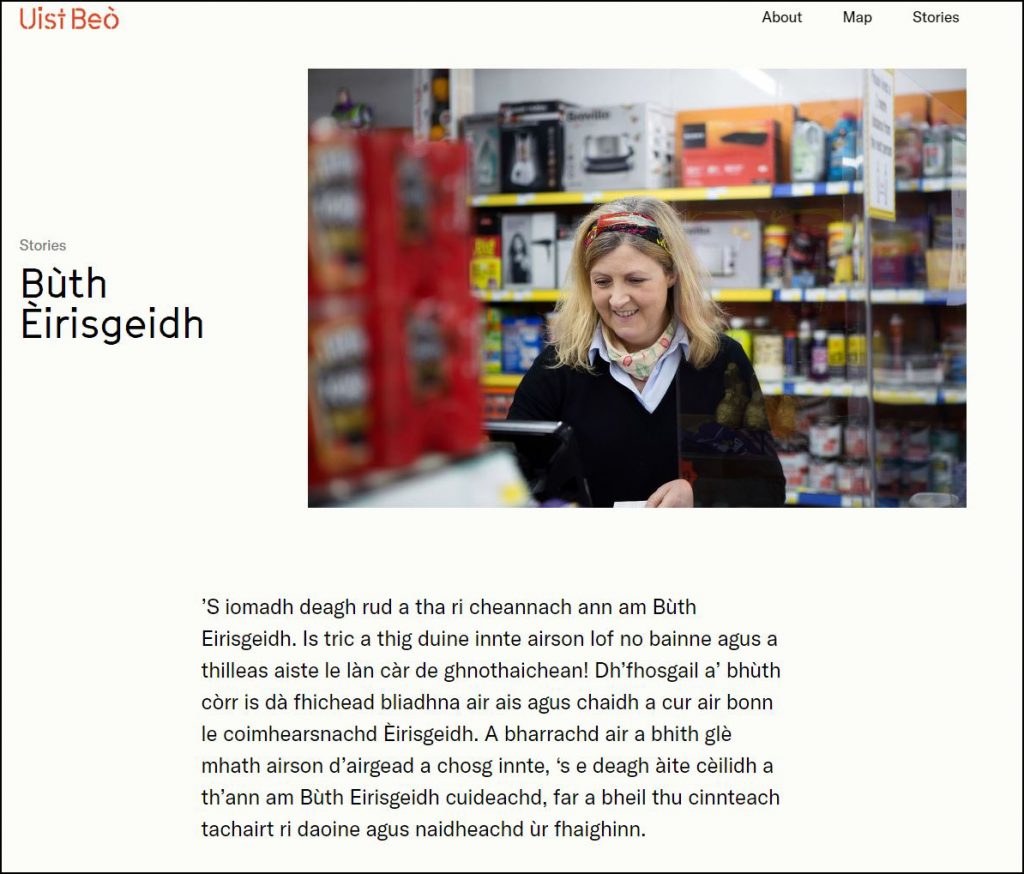
For visitors Uist is more than a destination to be ticked off a list, it is an active, inspiring, living community with a wealth of experiences to offer the conscientious visitor. We invite guests to our islands to take a slow, sustainable journey through Uist, meeting the individuals and organisations that forge our rich culture, carefully managed natural environment and strong community spirit.
Each of the eight islands that make up Uist has its own well-defined identity which we seek to celebrate alongside Uist’s unique and singular character within the Outer Hebrides.
Our interactive map is in the very early stages with a handful of businesses and services listed across the islands. As Uist Beo grows so will our database of Uist’s assets and in time we aim to create a comprehensive listing of businesses, services and social enterprises that serve Uist’s residents, visitors and diaspora alike.
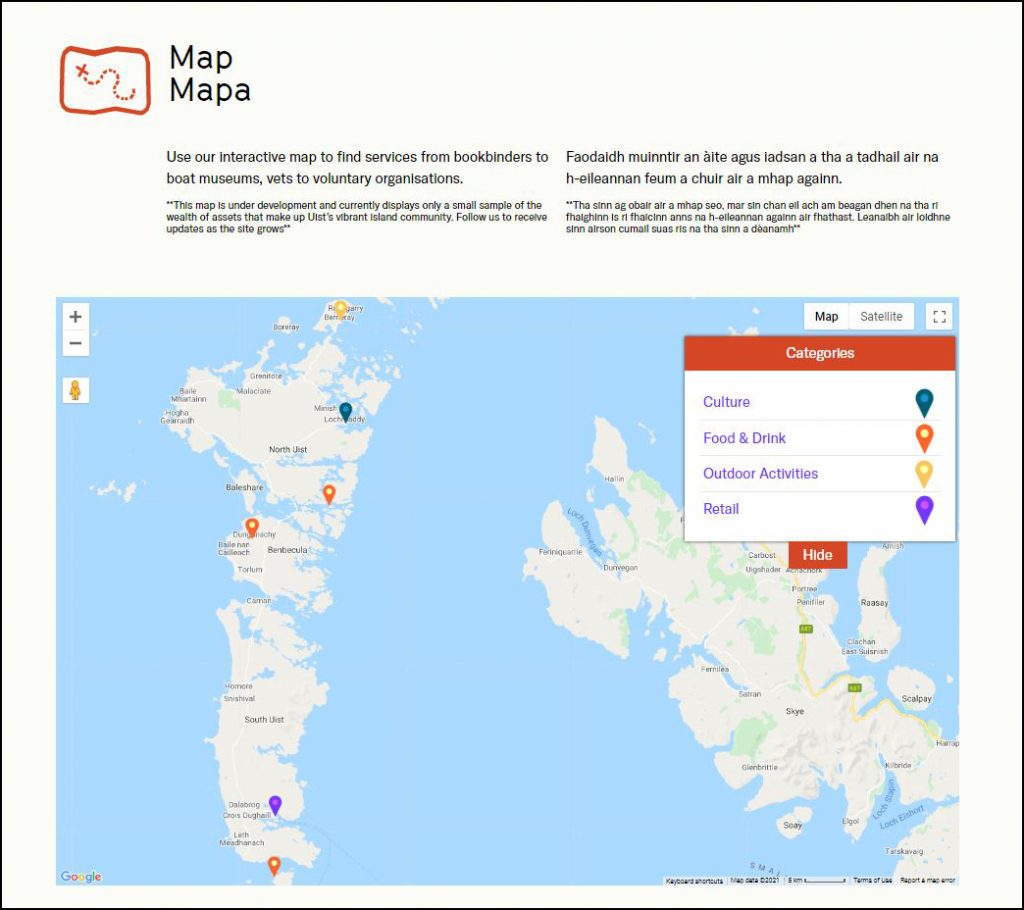
Uist Beò is in its early stages will grow and evolve with time, responding to the needs of our island communities. Follow us on instagram or facebook to keep up to date with our progress and please drop us an email if you have a suggestion for someone with a story to tell!
Uist Beo is a pilot initiative under CoDeL’s Smart Islands project, funded by Outer Hebrides LEADER. THE SMART ISLANDS PROJECT IS PART-FINANCED BY THE SCOTTISH GOVERNMENT AND THE EUROPEAN COMMUNITY OUTER HEBRIDES LEADER 2014-2020 PROGRAMME
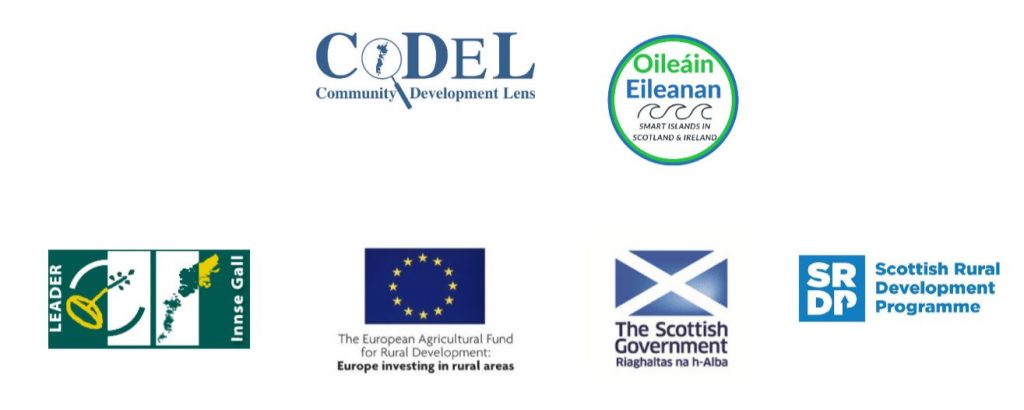
The results of the Northern Periphery and Arctic research project, to be launched on June 4th, argue that rural and island communities need to be seen in a new light following Covid-19. While the health and economic disruptions caused by Covid-19 are undeniable, on balance many rural and island areas have performed relatively well during the pandemic by drawing on a wide range of resilience factors both for health and the economy.
“We need to redefine how we view rural and island communities, and change policy accordingly,” says Theona Morrison, Director of CoDeL and Acting Chair of Scottish Rural Action.
Evidence for this comes not only from Scotland and Ireland, but also from Finland, Sweden, the Faroe Islands, Iceland, Greenland and Canada through the research funded by the (European) Northern Periphery and Arctic Programme (Covid-19 Response Call). It was delivered by 12 partners from Canada to Finland (universities and research institutes, public, private and third sector organisations) and led by CoDeL from the Outer Hebrides in Scotland. Together they make 18 recommendations for a new approach to policy and action for rural and island communities.
“One of the most stimulating, visionary but also evidenced and well informed documents I’ve come across in relation to post-Covid.” David Bryan, Head of Sustainable Business, Social Enterprise Academy, Scotland
You can read the Citizen Summary here.
Rural and island communities have benefited from their geography, including their remote and sparsely populated regions, and their access to nature. Cohesive communities and responsive local governance have found local solutions, for example to implement test and trace systems effectively, to shut down community transmission swiftly and to vaccinate local populations rapidly. There has been extensive community engagement and participation, volunteering and generosity expressed in practical action to help the most vulnerable in particular.
Economic responses in rural and island communities have been characterised most by flexibility and adaptation, innovation and creativity, collaboration and committed local customers. Over half of 62 entrepreneurs surveyed consider Covid-19 to have brought about new business opportunities. Technology companies across the Northern Periphery, many of them small and micro businesses, innovated or adapted their products, and expanded their markets during the pandemic (see Project C here). And regions in Iceland and Atlantic Canada have continued tourism activities with a switch to domestic tourism.
Thomas Fisher, the Project Manager and Director at CoDeL, says “the research is striking because of the weight of evidence it delivers across many different regions, from Finland to Canada, and across many different sectors, in 10 reports based on extensive desk research, 80 interviews and almost 30 case studies.”
“Above all,” he continues, “our analysis is rooted in the lived experience and voices of rural and island communities during the pandemic. The analysis is not seen through the lens of researchers who have little experience of life in remote areas, but was conducted and evaluated by researchers, many of whom themselves live in rural and island communities. It is they who are challenging traditional perspectives on peripherality, calling for the very concept of peripherality to be redefined.”
“We need to rethink both the concept of peripheries as well as the idea of the economy. I think that with all the case studies the research rigorously shows that there is no other way to think, and act. It is just the sort of academia we need now (and have needed before).” Prof Eeva Jokinen, Department of Social Sciences, Social and Public Policy, University of Eastern Finland
The key findings, recommendations and summaries from the report can be read here.
Policy-makers are taking note. The NPA programme has themed their next annual event in October under Redefining Peripherality. The Nordic Council of Ministers is funding four Nordic Talks by CoDeL and Nordregio on the same theme.
“The resilience shown by rural and remote communities during Covid-19 has been a testament to the inherent engagement, cohesiveness and flexibility of these communities. The pandemic has generated a renewed vigour in re-imagining life on the periphery as a very attractive place for people and businesses to come, work and live.” Liam Glynn, Professor of General Practice, School of Medicine, University of Limerick, Ireland
And people outside of these communities have noticed too. Covid-19 has radically shifted how people view the attractiveness of rural living. Many are fleeing cities and buying properties in rural areas and islands. This is leading to a critical housing crisis, excluding many local and young people from being able to live in these areas, the next “economic clearance” according to young Gaels.
“But these changes were already taking place before the pandemic”, argues Theona Morrison. “CoDeL research back in 2018 on young people returning and settling in Uist, the Islands Revival blog and declaration of 2019, and pre-Covid evidence gathered by this research project shows clearly how demographic trends were already changing. The pandemic has accelerated these trends.”
The research on the economic impacts brought together the following partners, as well as two external experts, Steve Westbrook and Associates, Scotland (economist in the Highlands and Islands) and Katinka Svanberg, Sweden and Melbourne University (human rights):


A campaign by ERS Scotland as part of the Our Democracy coalition has been launched to seek a change to the way that decisions are made in Scottish communities. The Declaration on Local Democracy asks that communities are given the powers to make their own decisions and plan their own futures, arguing that the people who live and work in them are the ones best placed to do so.
‘The pandemic has given us a fresh insight into what we already knew about Scotland’s communities; people will sacrifice their time and resources to aid their neighbours. But that sense of community cannot be taken for granted. Now, more than ever, we need to revitalise and remake our local democracy. That is why we are asking you to ‘act as if you own the place’—if the citizens of a village, town, city or country don’t own it, then who does?’
The petition has almost reached its goal of 2000 signatures, you can sign it here and read more about Our Democracy at their website.